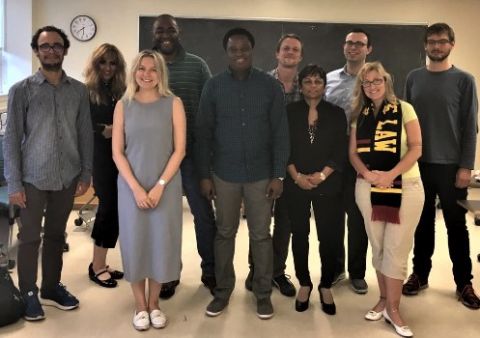
This year’s program boasts the highest graduate student enrollment in the Faculty’s history: both the highest-ever number of incoming LLM students (11) and the largest-ever PhD entering class (seven students).
“I am delighted to welcome this bumper crop of new grad students,” says Associate Dean (Graduate Studies and Research) Joshua Karton. “They are not just the largest but also the most diverse group of students we have admitted – diverse in every sense of the word.”
The new class members represent a range of professional backgrounds, including accountancy, academia, private practice, government, nursing and NGOs. They come from, or have lived for a long time in eight different countries (not including Canada), and at least two were born in each decade from the 1950s to the 1990s.
Between them, the new students have completed 18 previous graduate degrees; five have obtained first law degrees from civil law jurisdictions, four have no first law degree, and three are graduates of the Queen’s JD program.
“I’ve long believed that no law school – no university department for that matter – can be great without a great graduate program,” says Karton. “It’s a testament to Queen’s Law’s international reputation, its research strength, and its growing faculty complement that we have been able to expand our graduate program without lowering standards.”
New PhD student Graham Jones completed his JD at the University of Victoria and worked for the Federal Crown until 2008, when he became a sole practitioner helping legal aid clients with family law, civil law and other matters. In 2011, he attended the University of Amsterdam, where he published a master’s thesis on sexual minorities in Uganda. Currently, he is writing his doctoral dissertation on the intersection of technology and law of warfare. In particular, he says, he’s looking into how warfare has become informal in the age of artificial intelligence (for instance, as it concerns drone strikes), and accordingly, “whether it is right to kill someone without a trial in the first place.”
Returning to her alma mater is PhD candidate, Saro Persaud, Law’01, a Trinidad native who has also lived in Canada and South Africa. With a special interest in revenue collection models that grant Indigenous and other traditional governance bodies the authority to generate revenue, she is writing a comparative study of “Taxation Powers of Indigenous and Traditional Leaders/Authorities.”
“Having had an excellent experience with the Queen’s LLB program,” says Persaud, “it was natural that I return to the Faculty to complete my life-long academic journey.”
New LLM student Michael Adams, a JD graduate of the University of Saskatchewan, is focusing his thesis on the sentences reserved for “the worst of the worst offenders,” known as the dangerous offender regime.
Choosing the school to pursue this work was easy for him. “In addition to Queen’s reputation as one of the best law schools in Canada,” he says, “I came here primarily because it presented me the opportunity to work with many of the leading scholars in the fields of criminal law and sentencing.”
Does the increased enrolment present a problem for the Graduate Research Seminar taken by all first-year LLM and PhD students? “I actually don’t anticipate any additional challenges in teaching the larger class,” says Karton, the course instructor. “I think 18 is a great number for generating class discussions: big enough that you get a diversity of opinions but small enough that you can have a real back-and-forth and delve into issues in detail.”
By Aschille Clarke-Mendes